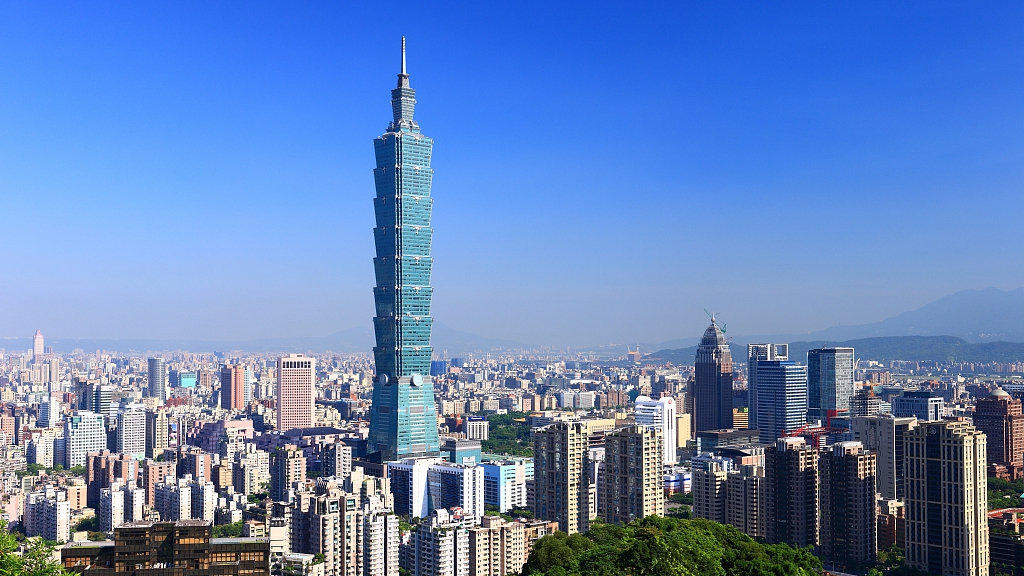Chang Chak-yan

The Taipei 101 skyscraper commands the urban landscape in Taipei, Taiwan. [Photo/Xinhua]
The inaugural speech of the new Taiwan island administrative head Lai Ching-te on May 20 revealed his true colors. Instead of acknowledging the 1992 Consensus that there is only one China, Lai laid emphasis on "democracy" and exposed his agenda of "Taiwan independence", which he expects to take forward with the support of so-called democratic countries led by the United States. All this shows Lai is foolish enough to think of confronting the Chinese mainland.
However, Lai's attitude is not incidental, given his track record of issuing provocative statements. There are three main reasons behind his provocative remarks and moves.
First, he is over-confident of achieving success because he won the island's leadership election, which in turn makes him believe he cannot fail on the political front. That his self-aggrandizing belief could bring more danger than hope is something he refuses to acknowledge. Even when it comes to cross-Strait relations, he exhibits the same attitude of unrealistic overconfidence.
Second, his "Taiwan independence" agenda has its origin in the policies of the Democratic Progressive Party, a party that provides shelter for separatist forces. Surrounded as he is by his separatist supporters, he cannot hide his true colors of being a bigoted separatist. It appears his political relationship with separatists is entrenched and strong.
Even though Lai is now the head of the island's administration, his identity as a separatist was evident throughout the election process, which suggests he is leading the island into a dead end.
And third, Lai, by refusing to acknowledge the 1992 Consensus, is trying to destroy the painstakingly built cross-Strait communication structure by the Straits Exchange Foundation and the Association for Relations across Taiwan Straits. If Lai continues to tread on the dangerous path he has chosen, the cross-Strait communication mechanism will collapse, making it impossible for the island to maintain constructive communication with the mainland and thus lose valuable trade.
According to political scientist Harold Nieburg, the collapse of all cross-Strait communication channels could lead to political upheaval, and even conflict. If that were to happen, separatists and political extremists on the island might target those people who oppose their divisive politics, which would be disastrous. Lai's attempts to sever all communications with the mainland indicate that he would solicit foreign help to counter the mainland.
Unfortunately, he seems to believe a confrontation between the US and its allies on the one side and China on the other would be a long-drawn affair, like the Cold War between the US-led West and the Soviet Union, which would give him enough time to achieve "Taiwan independence". He is wrong.
He also believes the US needs the island to confront China as much as the island needs US protection.
Lai's political agenda is one of gross miscalculation. Beijing has many ways to counter US interference in the Taiwan question. For example, the People's Liberation Army's drills and blockade of the Taiwan Strait and the waters around the island show the mainland is capable of reunifying Taiwan with the motherland, if need be, through the use of force. Such a blockade could isolate Taiwan and deter foreign investors from investing in Taiwan, which will weaken the island's economy.
More importantly, Taiwan voters will not be passive onlookers while Lai dismantles one cross-Strait communication channel after another. They will teach him a lesson in the next election. Also, as the PLA drill showed, the US and its allies cannot breach the blockade, no matter how well they try.
Indeed, the PLA is capable of thwarting any move by the separatists on the island to realize "Taiwan independence". The US seems not able to afford intervening in the PLA drills, Lai and his separatist followers may lose confidence in the US. Should Taiwan residents distance themselves from Lai and his party, the prospects for peaceful reunification will greatly increase.
The author is the dean of Taima Journalism and Information Academy, Malaysia.
-
Visa-free policy helps promote global exchanges
Visa-free policy helps promote global exchanges
-
China's ethnic groups adopt unity, equality
China's ethnic groups adopt unity, equality
-
Chinese tech to light up homes in South Africa
Chinese tech to light up homes in South Africa
-
Xi urges more contributions to education
Xi urges more contributions to education